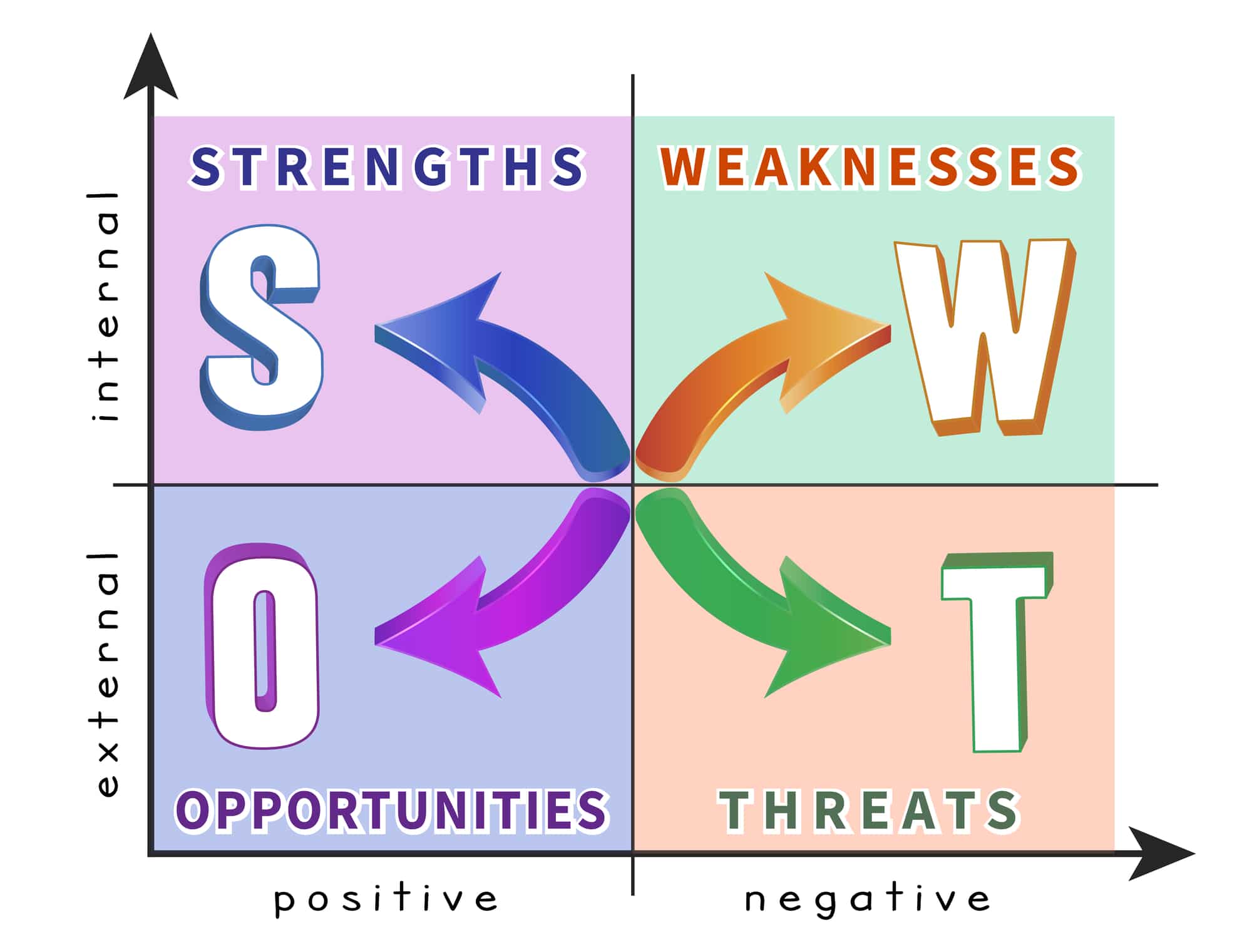Personal development is an essential step for making yourself more appealing to employers and customers. It also helps boost your self-image, self-confidence, and self-esteem. People often fail to analyze themselves and as a result, end up making bad decisions. Yet, many apply SWOT analysis effectively with professional tactics to stand out in a sea of candidates. They want to secure the top position, however, it is not as easy as it sounds.
Self-analysis can get complicated but can play a significant role in personal progress. To be successful in today's competitive world, it's essential for one to be able to identify his or her strengths and weaknesses, as well as the opportunities and threats that are presented to him/her.
SWOT is seen as an analytical framework that can help companies facing great challenges. It helps to find the most promising new markets. The analysis was created by business gurus Edmund P. Learned, Kenneth Andrews, C. Roland Christensen, and William D. in the 1960s. They wrote about it in their book "Business Policy, Text, and Cases."
Even though SWOT was originally used for business, it can help assess a person’s Strengths, Weaknesses, Opportunities, and Threats too. This kind of simple analysis structure will provide guidance as it looks at internal and external factors. Do not take the SWOT analysis lightly.
Self-analysis is perhaps one of the most complicated things. But, it plays a very significant role in personal progress and building on personal skills. SWOT analysis will help you to learn more about yourself. Carrying out a personal SWOT analysis is an important step towards finding life and career direction.
Follow all steps earnestly and create your own Personal SWOT analysis.
Before you allot precious time in the process, make sure that you are ready to provide honest answers to yourself. While we easily scrutinize companies, jobs, employers, and colleagues, criticizing ourselves is the first step here.
Dig deep and identify what your own contributions really are. The analysis entails finding out what you are good at and what you are terrible at. SWOT is a tool for you. After you learn all the necessary details about yourself, you can make an effort to make positive changes which will lead to new opportunities. Basically, SWOT analysis provides a better picture of all pros and cons you have.
The outcome will depend on how you react to the findings. For example, you can react in 2 ways after you list all your weaknesses. You can either understand how they can be threatening to not only your career but also your personal life, or you can work to overcome the weakness. It is always wise to think positively. Act proactively to turn the weakness into strength. Also, try to eliminate all threats. Give importance to your strengths and take advantage of the opportunities.
SWOT for personal development can help the following people:
- Students
- Managers and Owners
- Professionals, Executives
- Career Starters
- Practitioners and HR
- Doctors and Engineers
- Employees
- Husband and Wife
- Parents

The elements of a Personal SWOT analysis
A personal SWOT analysis involves finding out the qualities of a person. SWOT is an evaluation tool used for identifying the loopholes and strong points and implementing them in an orderly fashion. After the evaluation process, an effort is required to implement changes that are positive and can lead to further opportunities. Carrying out SWOT analysis highlights the pros and cons a person possesses but the result will depend on how an individual responds to the analysis and implements it accordingly.
A SWOT analysis focuses on the 4 elements included in its acronym. Knowing about these positive and negative factors can help you make changes more effectively. Typically, a SWOT analysis is done by creating a table, divided into 4 columns. Usually, the strengths and weaknesses do not match the opportunities and threats listed. Remember that pairing external threats with internal weaknesses can help highlight the most serious issues.
An individual can react either by improving his/her weaknesses and overcoming the loopholes or taking advantage of the strengths but also realizing the threats that can overshadow strengths and opportunities. Working on weaknesses is an important step in implementing SWOT analysis. It is wise and productive to accept weaknesses and convert them into strengths, plus eliminate the threats.
How to conduct a SWOT Analysis of Yourself
For each of the SWOT elements, ask yourself some questions. I have listed some example questions below, but they may vary.
Strengths
Strengths are internal positive attributes or capabilities a person has control over and can make full use of.
- Skills, competencies, knowledge
- Education
- Strong personality
- Confidence
- Commitment, enthusiasm, and passion
- Achievements
- Personal resources
- PR and connections
Questions that can reveal your strengths:
- What benefits do you have which others do not have? This could include skills, education, or connections.
- What are you better at than anyone else?
- What personal resources do you have access to?
- What do other people see as your strengths?
- Which achievements are you most proud of?
- What values do you believe in that others fail to show?
- Are you part of a network no one else is involved in? What connections do you have with powerful people?
Weaknesses
Weaknesses are negative aspects and attributes which have little control over.
- Personal nature or tendencies
- Lack of education
- Lack of work experience or expertise
- Less resources
- Hygiene issues
- Lack of career direction or focus
- Negative work habits
Questions that can reveal your weaknesses:
- What work do you usually avoid because of lack of confidence?
- What do people think you weaknesses are?
- Are you happy with your education and skills training?
- Do you have any negative work habits?
- Which of your personality traits hold you back?
Opportunities
Opportunities are uncontrollable external events a person can potentially leverage.
- Favorable job or work trends
- Developed Improving economy
- Job vacancies and openings
- Training opportunities
- Technology advancements
- Demand for Expertise and skills
Questions to ask yourself when looking for opportunities:
- What new technology can assist you?
- Can you take advantage of the market in its present state?
- Do you have a network of strategic contacts to offer good advice or help you?
- Is any of your competitors failing to do something important? Can you take advantage of it?
- Is there a need in your company which no one is filling?
- Could you create an opportunity by offering solutions to problems?
Threats
Threats are uncontrollable external factors that might overcome or damage the strengths and opportunities.
- Job insecurity
- Downsizing and restructuring
- Changing market trends
- Fewer job opportunities
- Unrest
- Emerging competition
- Changing professional standards
Questions to ask yourself when looking for potential threats:
- What hindrances do you currently face at work?
- Is any of your co-workers competing with you for projects or roles?
- Is your job changing?
- Can technological changes threaten your position?
- Could any of your weaknesses lead to threats?

The Advantages of Conducting a Personal SWOT Analysis
The main purpose of a SWOT is to promote the identified strengths, reduce weaknesses, exploit the opportunities and have contingency plans to minimize threats.
There are many benefits and advantages of using SWOT Analysis for self-development. It is good for your success, self-confidence, and self-improvement. Some of the most common benefits of conducting a personal SWOT analysis are:
- It helps to develop strategies to attain your goals
- You can be better than your friends and colleagues
- Shows where you currently stand on the path of success
- Measures your scopes of reaching desired goals
- Boosts your career, life and personality
- Increases self-confidence and self-esteem and helps to better understand self-image
- Helps to better understand who you really are as a person
- Maximizes your strengths and diminishes your weaknesses
- Explores and also enhances your soft skills and hard skills
- It helps you understand your preferences and personality traits.
- Focuses on your attitudes, abilities, skills, capabilities and capacities
There are many other advantages of this analysis. Apply it to your situation and enjoy the awesome benefits of a personal SWOT analysis.

Implementing SWOT Analysis for Personal Development
Implementing the analysis simply means transforming weaknesses into strengths and threats into opportunities. It’s easy to think about, but it’s much harder to implement in life. The key is to understand what implementing means.
The first approach is to transform weakness into strength. For instance, if a person is not creative and decides to overcome that hurdle and become creative no matter what, the positive adrenaline changes his course of thinking and starts taking effect. Creativity is a skill, based on the growth mindset which can be cultivated.
The second option is to find a different context for weakness and try to see it as a feature. For example, a manager who has a hard time staying focused and is not good at dictating and getting things done can be a successful entrepreneur or take up some other profession. A good personality will mostly come from limitations, not strengths. It’s the outcome of working around shortcomings and using all the skills you can muster.
There is also a third option. In case a weakness cannot be converted or implemented, then minimizing weaknesses or avoiding them might sort the problem. The purpose is to neutralize weaknesses to a point at which strengths can be unfettered.
Avoiding complexity and overanalyzing the analysis might have the opposite effect. It’s good to keep the SWOT analysis short and simple by building different strategies and options. Testing some assumptions and performing regular updates would be necessary for continued results. A SWOT analysis helps in progress in life and building a superior strategy and executing it.
SWOT analysis can be ineffective if it is treated as a 'laundry list’. The only difficulty with analysis is its authenticity of results, which can be biased because it’s not easy to evaluate yourself. Professional help or counseling should be taken in case you feel you need assistance. The results can be subjective and vulnerable to perceptional differences of each person. Moreover, lack of accountability is a major factor since an individual might not have enough motivation to change.










